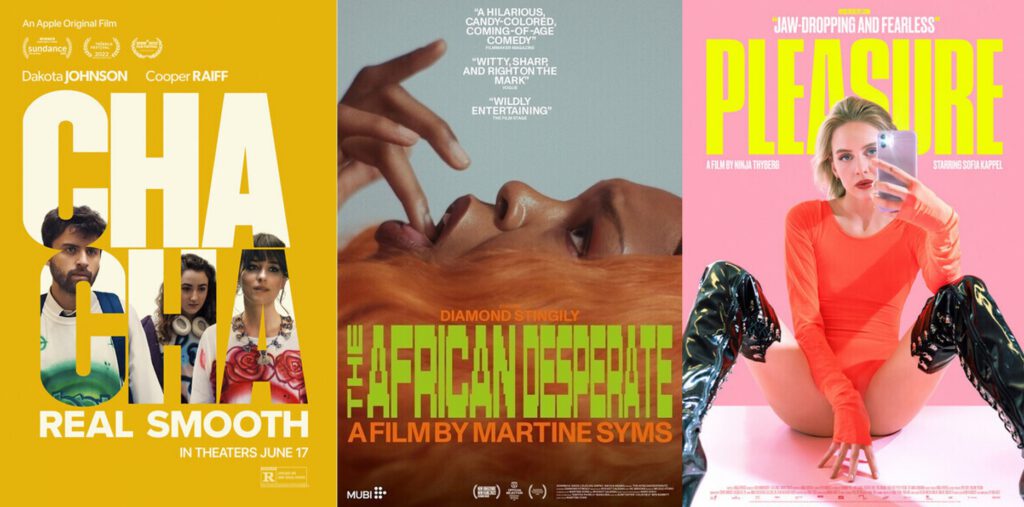We asked ten contributors to pick three films from 2022 that they think everyone should see before making their top ten lists of the year. These are the choices of Peyton Robinson.

“Pleasure”
Ninja Thyberg’s dauntless depiction of consent and sexual politics received a limited theatre release this year, which has arguably caused it to fly under the radar in end-of-year conversations. “Pleasure” follows Bella (Sofia Kappel) as she moves from her small Swedish hometown to Los Angeles with the ambition of being the world’s next big porn star. The film markedly articulates the dynamics of the most personal and intimate acts made professional, and the story’s authenticity is aided by the ensemble of real-life adult actors that share the screen with Kappel.
Thyberg strings together an honest, and at times disturbing narrative with a delicate hand. Her nuance in spotlighting the porn industry’s misogyny, racism, and abuse of power, while also treating the profession of sex work with the respect and empathy it deserves, is masterful.
The unflinching realism of Bella’s foray into the seedy corners of the industry is a true catalog of agency; the same can be said for how “Pleasure” portrays the sisterhood between performers and the population of conscious, ethical creators. Thyberg’s movie takes a battering ram to the doors of secrecy and shame that prevent us as a society from knowing more about porn; It humanizes an industry seen as pure objectification and transfers the power of the narrative from the viewers to the creators.
“Pleasure” is a whirlwind of unprejudiced, relentless realism with one of the most candid character arcs in a film this year. The double debut of Sofia Kappel and Ninja Thyberg deserves all the flowers in a 2022 lineup consisting of many veteran actors and filmmakers. “Pleasure” is an attentive document of sex work at its highs and lows, and the strength and power of the women in its spotlight.

Martine Syms’ adult coming-of-age comedy “The African Desperate” has its finger on the feeling of post-grad limbo. Diamond Stingily stars in the movie s Palace, an MFA graduate spending her final days on campus before returning home to Chicago. The film is one of the most unique of the year stylistically, and Syms’ fine art background shows through in its artistry (and the cast list).
With unique montages and collages, sonic experimentation, and painterly cinematography, “The African Desperate” is like an expert hodge-podge of creative source material; it feels hand-crafted. It’s stylistically bold yet subtle in the delivery of its substance and subtext, a dichotomy that’s creates a layered, engaging film. This film is waggish, and the dryness of the humor is not only a comedic technique, but a glimpse into the protagonist’s withdrawn interiority.
There hasn’t been another character I’ve seen this year that has mastered a genuine portrayal of displacement, both emotionally and physically, as Palace, a Black woman who navigates the fine art sphere and the loss of the school’s security and subsequent adulthood she now has to face. “The African Desperate” also tackles the hypocrisy of chronically online liberalism, the pissing contests in fine art academia, and the lack of finality one feels after “checking the box” of college.
“The African Desperate” is singular. Its silky-smooth flow between floating-consciousness trip scenes and in-the-trenches existentialism makes for a dazzling portrait of a woman in limbo, and one of the most captivating films of the year.

Cooper Raiff’s sophomore feature, “Cha Cha Real Smooth,” premiered at Sundance this year and was followed by an Apple TV release. The dramedy follows Andrew (Raiff), a college grad working as a “party starter” for local bar mitzvahs, as he strikes up an emotional friendship with a woman named Domino (Dakota Johnson), and her daughter, Lola (Vanessa Burghardt). The same tenderness that Raiff accomplished in his debut, “Shithouse,” is elevated ten-fold in this film. “Cha Cha Real Smooth” delivers a tangible feet-on-the-ground sense of intimacy, and a plush sensitivity that outlines every interaction. Raiff manages characters with neurodivergence, both plain (Vanessa Burghardt is autistic, as is her character, Lola) and implied (Andrew’s character very much feels like he is coded to have ADHD) with expert empathy and nonchalance.
The central trio of characters have palpable chemistry, motivating the film’s empathy. However, it is Raiff’s own character that strums at your heartstrings the most. Andrew’s character is real, alive, and the beating heart of the film. He feels well-acquainted with Gen-Z adulthood in a year of filmographies that only caricaturize it.
“Cha Cha Real Smooth” threads together the tedium of post-grad uncertainty with the turbulence of unrequited love. Yet, even with the profound passion throughout, it’s undoubtedly a riotous comedy, achieving its hilarity with ease. There are no feelings of set-ups and punchlines, only moments of effortless humor plucked from interactions in which we can view ourselves. In moments of pure joy or of beat-by-beat melancholy, every piece of “Cha Cha Real Smooth” feels adjacent to reality.












